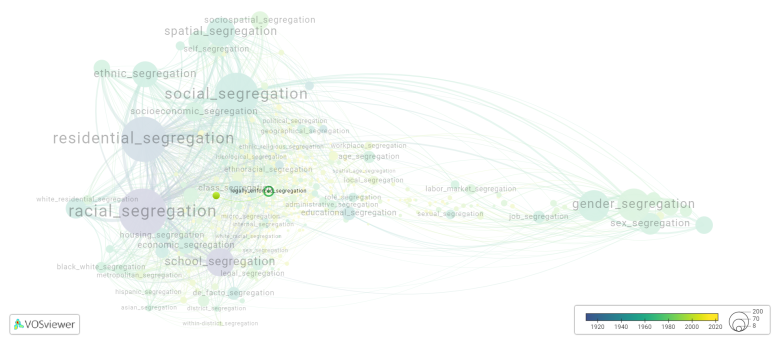Legally enforced segregation: Difference between revisions
(Creating page) |
(Creating page) |
||
| (3 intermediate revisions by the same user not shown) | |||
| Line 9: | Line 9: | ||
Legally enforced segregation is frequently discussed in the literature with the following segregation forms: | Legally enforced segregation is frequently discussed in the literature with the following segregation forms: | ||
[[ | [[residential segregation]] | ||
[[File:legally_enforced_segregation.png|780x780px]] | [[File:legally_enforced_segregation.png|780x780px]] | ||
This visualization is based on the study [[Segregation_Wiki:About| The Multidisciplinary Landscape of Segregation Research]]. | |||
For the complete network of | For the complete network of interrelated segregation forms, please refer to: | ||
* [https://tinyurl.com/2235lkhw First year of publication] | |||
* [https://tinyurl.com/2d8wg5n3 Louvain clusters] | |||
* [https://tinyurl.com/223udk5r Betweenness centrality] | |||
* [https://tinyurl.com/244d8unz Disciplines in which segregation forms first emerged (Scopus database).] | |||
==References== | ==References== | ||
==Notes== | ==Notes== | ||
Latest revision as of 07:17, 16 October 2024
Date and country of first publication[1][edit | edit source]
1985
South Africa
Definition[edit | edit source]
Legally enforced segregation refers to the system of laws and regulations that require the separation of individuals or groups based on characteristics such as race, ethnicity, or religion. This form of segregation was commonly practiced in the United States during the Jim Crow era, where laws mandated racial segregation in public facilities, schools, housing, and other areas of society. This system institutionalized discrimination and inequality, and was eventually abolished through the Civil Rights Movement and legal challenges to segregation laws.
See also[edit | edit source]
Related segregation forms[edit | edit source]
Legally enforced segregation is frequently discussed in the literature with the following segregation forms:
This visualization is based on the study The Multidisciplinary Landscape of Segregation Research.
For the complete network of interrelated segregation forms, please refer to:
References[edit | edit source]
Notes[edit | edit source]
- ↑ Date and country of first publication as informed by the Scopus database (December 2023).
At its current state, this definition has been generated by a Large Language Model (LLM) so far without review by an independent researcher or a member of the curating team of segregation experts that keep the Segregation Wiki online. While we strive for accuracy, we cannot guarantee its reliability, completeness and timeliness. Please use this content with caution and verify information as needed. Also, feel free to improve on the definition as you see fit, including the use of references and other informational resources. We value your input in enhancing the quality and accuracy of the definitions of segregation forms collectively offered in the Segregation Wiki ©.
Legally enforced segregation appears in the following literature[edit | edit source]
Swartz L. (1985). Issues for cross cultural psychiatric research in South Africa. Culture, Medicine and Psychiatry, 9(1), 59-74. Kluwer Academic Publishers.https://doi.org/10.1007/BF00048537
Lemon A. (2011). Residential Segregation: Apartheid. International Encyclopedia of Housing and Home, 111-120. Elsevier.https://doi.org/10.1016/B978-0-08-047163-1.00088-6

